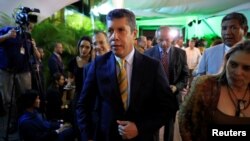Venezuela's opposition coalition decried a decision by a former state governor to run against President Nicolas Maduro in elections in April, accusing him on Wednesday of undercutting their strategy of boycotting the vote.
Henri Falcon, 56, a former military man who broke with the ruling socialists in 2010 to join the opposition, launched his candidacy in defiance of the Democratic Unity coalition's policy of not fielding candidates to isolate Maduro.
"With this step, Henri Falcon abandons the (Democratic) Unity and the Venezuelan people's democratic sentiment," the coalition said in a series of angry tweets.
"We cannot legitimize a fraudulent election system. We call on Venezuelans to keep fighting for democratic change."
Opponents say Maduro, 55, has rigged the April 22 presidential vote by ensuring his most popular rivals – Leopoldo Lopez and Henrique Capriles - are barred from standing.
Hard-line protest leader Lopez is under house arrest accused of fomenting violence in anti-Maduro demonstrations in 2014, while Capriles is prohibited from holding offices on a charge of "administrative irregularities" when he was a state governor.
Both men say the accusations were made up to sideline them. Critics also accuse authorities of skewing the field by barring opposition parties from using their party names, failing to reform the pro-Maduro election board, and keeping hundreds of thousands of Venezuelans abroad off the electoral register.
Falcon, however, has decided to challenge the president he calls the "hunger candidate" in reference to Venezuela's dire economic crisis. He hopes to benefit from widespread dissatisfaction with Maduro and the ruling Socialist Party during a fifth year of recession that has left millions hungry, caused widespread shortages, and fueled a migration exodus.
'Horrible misery'
"I speak in the name of millions of Venezuelans whom the government promised paradise but gave hell, with a failed and illegitimate model that has plunged us into the most horrible misery of the last 100 years," Falcon said on Wednesday.
"We must win this election because people do not surrender. They fight, suffer and rise up."
Given his roots within "Chavismo" - as the ruling movement is known after former President Hugo Chavez - Falcon may appeal to some government supporters, although many also view him as a traitor for having jumped to the opposition eight years ago.
On the other hand, many opposition supporters are also angry with Falcon for deciding to run, saying he is a sellout who is being exploited by Maduro to give legitimacy to a sham election.
One recent poll, however, bucked the consensus of most political analysts by showing Falcon would in fact have a real chance of defeating Maduro.
The survey of 1,000 people in early February, by local pollster Datanalisis for Wall Street investment bank Torino Capital, said that in a two-way race Falcon would defeat Maduro by 45.8 percent to 32.2 percent of likely voters.
Several other minor figures have registered for the election, but have little chance of making an impact.
Maduro's overall approval rating was up 4.4 points to 26.1 percent, the poll showed, citing the impact of government handouts including food bags, while Falcon's rating was 38.7 percent.
Falcon styles himself a center-leftist, seeking to combine business-friendly economic policies with strong welfare programs.
Western nations and a dozen Latin American neighbors have been highly critical of the April election, saying Maduro was depriving Venezuelans of fair voting conditions.
Washington is considering slapping oil sanctions on the OPEC nation if Maduro presses ahead without reforms.
Maduro says Venezuela's election system is clean, and accuses the United States of leading a right-wing international conspiracy to end socialism and take over his nation's oil.





